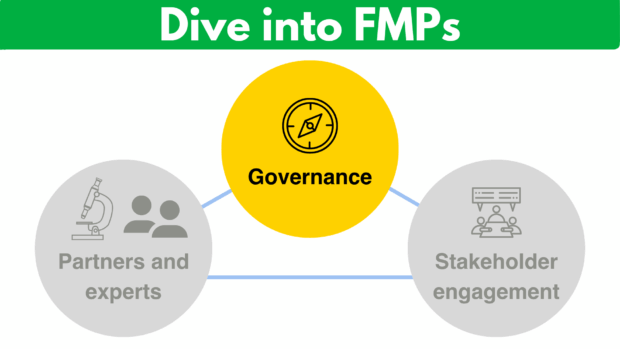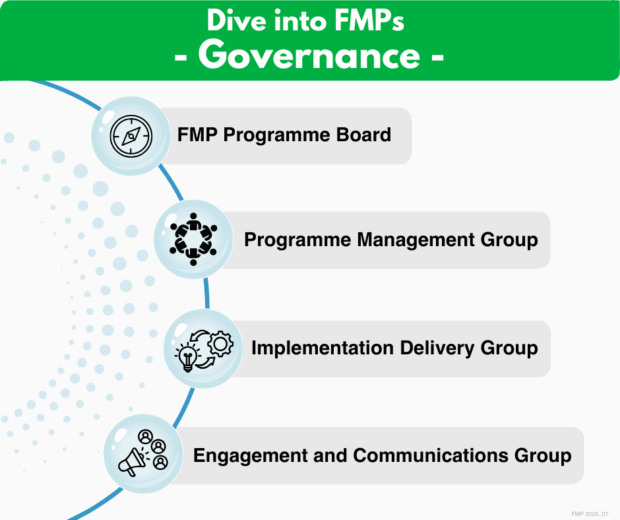
As we progress with our fisheries management plans (FMP) journey we want to help you understand how the plans are delivered.
This is the first post in a three-part series to dive into FMPs. I hope that it helps you understand who does what, and how and when the valuable information, views, and opinions from experts and stakeholders are brought in.
Part two will look at our partners and experts and part three will explore stakeholder engagement and some of the groups and forums that we lead or collaborate with.
In this post, we'll look at our overarching programme governance.
We'll cover who's in charge, how decisions are made, and how risks are managed. Having a solid governance structure is crucial for keeping things running smoothly and ensuring that all our hard work pays off in the end.
First, I’ll start by explaining the terms mentioned above.
What is the FMP ‘programme’?
A programme is the coordinated management of multiple projects that work together to deliver strategic, or long-term, outcomes and benefits.
The FMP programme consists of projects delivering Defra’s 15 FMPs which aim to meet the objectives set out in the Joint Fisheries Statement with the shared ambition of delivering world class, sustainable management of our sea fisheries and aquaculture across the UK, and to play our part in supporting delivery of this globally.
What is governance?
Programme governance leads the way we work. It’s the framework or structure that gives our work direction and keeps our programme on track, giving clear leadership, clear decision-making processes and accountability at every level.
Whether its managing risks, making sure we have a suitable resource allocation or keeping stakeholders engaged, it’s necessary to keep things efficient and successful.
Within FMPs, our governance makes sure that our work is aligned with Defra's strategy and goals. It helps us to safeguard and balance stakeholder interests and helps us be compliant with the law and reduce risks.

FMP Programme Board
At the head of our governance structure is the Board which provides direction, oversight, and accountability.
It gives long-term strategic leadership and makes decisions around the prioritisation of work and resources to ensure that the programme delivers high-quality FMPs.
It also makes sure that the work being done is aligned within the Defra group and helps us to manage any potential risks and issues.
Members of the board include senior representatives from:
- Department for Environment, Food and Rural Affairs (Defra) including colleagues from across the Marine and Fisheries directorate such as EU fisheries negotiations and policy, and evidence and evaluation.
Other members and subject matter experts are invited to support and advise the board when needed.
The following groups take a strategic long-term vision but also directly support the day-to-day delivery of FMP work.
Programme Management Group
This group reports on the progress of FMP development and supports the design and publication of plans through lessons learned and risk management.
Members include Defra policy teams, delivery partners and experts from MMO, Cefas, AIFCA and Seafish, JNCC and Natural England as well as ICF who is evaluating the programme.
We will talk about our delivery partners and projects in our next post of this series.
Implementation Delivery Group
This group, with members from Defra, MMO and AIFCA, tracks the delivery of the goals in the published FMPs and identifies and acts on any barriers to make sure things are moving on as planned.
Engagement and Communications Group
This group brings together people responsible for FMP engagement and communications from across Defra’s policy teams and delivery partners. The group works to coordinate activities across the projects in the programme and takes a long-term approach to planning.
Working on joint plans
Defra is the ‘coordinating authority’ responsible for preparing and publishing 15 of the 43 FMPs. We work alongside the other ‘fisheries policy authorities ‘- Northern Ireland, Scotland and Wales, on joint plans where one or more of the authorities work on them together.
We hold regular meetings with the other authorities to keep on track with progress towards delivering our joint plans. This mainly takes place through monthly meetings with a working group, where Defra policy officials work closely with their counterparts to support the preparation of these FMPs.
See who is responsible for FMPs on the full list of FMPs
Keep an eye on the blog or subscribe to be notified of the next two posts in this series.
6 comments
Comment by Greg posted on
Why isn't there a Recreational Sea Angling representative on the FMP Programme Board?
RSAs are stakeholders in the fishery so should be represented in this key decision making body.
Its notable that 'Seafish' have representation at multiple levels of governance.
Comment by Nicola posted on
Thank you for your comment.
This post is on Governance- which is how the programme is led. Defra is the coordinating authority for 15 FMPs and therefore leads the programme.
The board is made up of Defra’s agencies or public bodies, and AIFCA who represent the ten IFCAs who are considered public bodies.
Board members are chosen because they are accountable for leading, co-ordinating, and delivering significant workstreams on the programme, including drafting and implementing FMPs or providing evidence. The board allows us to hold those organisations to account for delivering those.
In the JFS, all authorities committed to working partners and engaging with a range of stakeholders. Our board member organisations play a key role in engaging with stakeholders across the sector during the development stages of FMPs, giving a wider audience the opportunity to shape future policy making. How and when this happens is tailored with each FMP as they are specific to the fishery.
Comment by Robin Bradley posted on
I notice that Seafish sit on several of the FMP Governance groups, yet there is no place for groups which represent recreational sea angling.
Comment by Nicola posted on
Thank you for your comment.
Defra is the coordinating authority for 15 FMPs and leads the programme and governance. Members of the board are Defra’s agencies or public bodies, which include Seafish, as mentioned in my response to an earlier comment, which has more details.
Sea angling groups, and individuals, are involved at different stages of FMP development so please look out for the next posts in the series which go in to these.
Comment by MichaelB posted on
Will minutes be available from the various FMP Governance groups ?
Comment by Nicola posted on
Thank you for your question. We don’t publish minutes from our FMP governance groups but we do publish minutes from other groups and updates are shared on the blog where we can. Please look out for the last post in the series which goes into groups.